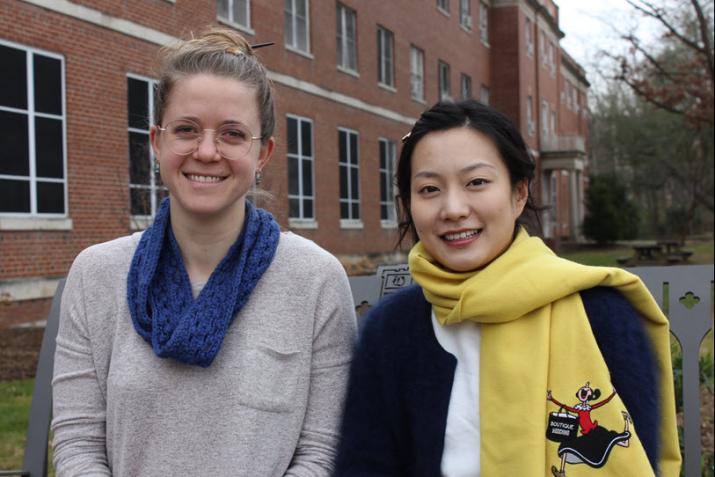
Julie Zemke (left) and Jiyan Ma, two of the six students who participated in academic internships at RTI International and FHI 360 last fall.
Published January 21, 2019, last updated on April 7, 2020 under Education News
The Triangle area of North Carolina—the cities of Raleigh, Durham and Chapel Hill—is home to many of the 200+ organizations, companies and academic institutions in the state working to improve global health. And now, through academic internships, more Duke Global Health Institute students than ever are getting a chance to experience what it’s like to work at these organizations.
Last semester, six Duke Global Health Institute (DGHI) master’s students completed academic internships: four at non-profit organization FHI 360 and two at RTI International (RTI), a non-profit research institute. Both organizations are based in the Triangle with regional offices throughout the U.S. and across the world.
DGHI began offering academic internships with FHI 360 in the 2017–2018 school year, and the success of that program led to a larger DGHI intern cohort at FHI 360 and similar opportunities at RTI this academic year. Sarah Martin, assistant director for graduate admissions and special projects at DGHI, works to connect students to structured internships developed by the organizations, with project goals and intended outcomes. Upon successful completion of the internships, students earn academic credit.
“The range of internship topics across these two organizations is very broad, spanning from reproductive health to HIV screening to global health security,” said Martin. “In addition to providing relevant work experience, the internships also help students build their professional networks.”
“My internship felt like a logical next step toward applying what I’ve learned from my courses and fieldwork in a professional setting,” said Julie Zemke, a second-year master’s student who interned with RTI’s newly established global health security initiative. “And it also enabled me to develop relationships with people who were incredibly generous with their insights about finding the right position in the Triangle after I graduate.”
Second-year master’s student Jiyan Ma, who worked on the validation of an HIV screening tool in FHI 360’s technical support division, says the internship helped her advance her research skills and gain a better understanding of the qualifications needed and duties performed in an NGO. Plus, interning at FHI 360 brought one of her dreams to fruition: “I’ve always wanted to work at FHI 360, even before I came to the U.S.,” notes Ma, who is from China.
The fact that the internships are unpaid and credit-bearing allows international students like Ma—who are not eligible for paid off-campus work experiences—to take advantage of the internship opportunities.
FHI 360 and RTI have invested significantly in ensuring a positive experience for their student interns. Both organizations view focused supervision and mentorship as a key to success. According to Mary Kate Hom, internship and student engagement specialist at RTI, “Our main focus is to ensure that the interns are getting hands-on, mentored learning while doing work that’s meaningful to them as students and to RTI as a research organization.” She notes that each intern at RTI is paired with a dedicated mentor who assigns them projects they can complete independently as well as tasks that may prove more challenging and require guidance.
Moses Bateganya, director of FHI 360’s technical support division and Ma’s supervisor, says that at FHI 360, making sure that the internship project addresses the needs of both the intern and the organization is critical. He also emphasized the importance of creating an environment where the intern feels part of the team. “We invited Jiyan to team meetings, gave her opportunities to present and introduced her to key staff members in research, service delivery and other departments,” he said.
But the interns aren’t the only ones who benefit; the host organizations also reap rewards from the program. At RTI, for example, recruiting DGHI interns is part of a broader collaborative venture called the RTI–Duke Global Development Initiative. One of the initiative’s objectives is to “support the next generation of development professionals by engaging Duke students in RTI research and implementation.” To Alison LeFew, the initiative’s project manager, internships are a natural fit for addressing this objective, along with other student engagement opportunities currently underway. LeFew notes that the DGHI students are “applying their experience from the classroom and the field and asking good questions in the work environment, and this adds tremendous value to our research and programs.”
Hom, the internship and student engagement specialist, said that the students’ research skills and international experiences are particularly valuable at RTI. And Katie Cretin, senior public health manager and Zemke’s supervisor at RTI, explained that in addition to helping staff meet their deliverables, the interns “bring a fresh perspective and new vantage point” to the projects.
“Academic internships are a win-win for the students and the organizations hosting the interns,” said Martin. “In the future, we hope to enable more students to participate by expanding these offerings at the current locations as well as at other local global health organizations.”
